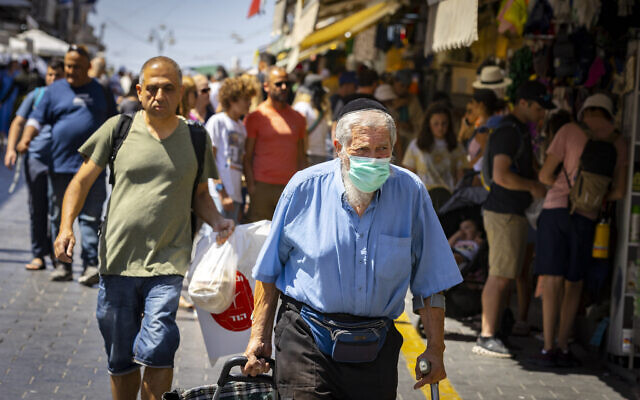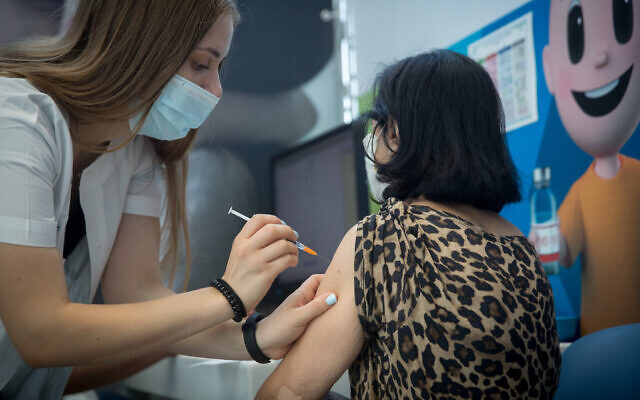The Health Ministry has advised some Israelis to start wearing masks again in reaction to a rise in the number of COVID-19 cases and hospitalizations as the Jewish New Year begins. It also promised that COVID booster vaccines effective against the predominant new variants would be available soon.
With families and friends getting together for Rosh Hashanah meals and large groups gathering in synagogues for prayer beginning Friday, the ministry recommended that the elderly and those with underlying health issues or compromised immune systems mask up, at least in indoor and enclosed spaces. Anyone— regardless of age or medical history — wanting to minimize their chances of catching COVID should consider wearing a mask.
In an announcement released on Tuesday, the ministry also advised those with signs of illness to remain isolated at home until they are completely symptom-free. If they must go out, they should wear a mask to avoid infecting others. The ministry also recommended that people buy home COVID test kits and use them to determine whether their illness is caused by the SARS‑CoV‑2 virus.
The ministry said it was “constantly monitoring all illness trends and COVID variants. At this time there is a mild increase in the number of hospitalized patients. In Israel, as in the rest of the world, there are several variants that are causing illness.”
The Health Ministry’s announcement came only after the media and public began questioning why it hadn’t provided guidance as the recent uptick in COVID cases at home and globally became apparent.
Many people know someone who has recently contracted the virus, but for the most part, the cases seem to be relatively mild. Immunologists believe this is due to widespread COVID immunity that has accrued over the last three and a half years due to people having been vaccinated, sick with the disease, or both.
The latest COVID statistics from the Health Ministry released on Sunday indicated that 20 percent of Israelis tested were positive for the virus. There were 988 new COVID cases last week, a 1.8% increase over the previous week. There are currently 1,093 confirmed active cases, among them 282 being treated in hospitals. Forty-seven patients are in critical condition, with 11 on ventilators.

People, some with face masks, shop for groceries at the Mahane Yehuda market in Jerusalem on July 7, 2022. (Olivier Fitoussi/Flash90)
The numbers are believed to not fully reflect the rate and spread of the virus, as only patients actively treated in hospitals or community health centers are included in Health Ministry information.
After last week’s COVID statistics were released, news broke that classes for 12th-grade students at the Hebrew University Secondary School in Jerusalem, known as Leyada, were moved to Zoom studying this week after 38 students and four staff members tested positive for COVID and were told to isolate at home.
On Monday, the US Food and Drug Administration approved an updated COVID booster shot and the Centers for Disease Control and Prevention recommended it for everyone aged six months and up. Although the shots are already available in the US, Israel’s Health Ministry has said only that they will be here “soon.”
The booster shots are updated versions of the existing Moderna and Pfizer-BioNTech vaccines and have been formulated to target an Omicron subvariant that emerged late in the spring called XBB.1.5.

An Israeli woman receives a COVID-19 vaccine booster shot at a Clalit clinic in Tel Aviv on August 10, 2021. (Miriam Alster/Flash90)
Since then, the EG.5 (Eris) variant has become dominant, with the BA.2.86 (Pirola) emerging in late July. The latter, which uniquely has more than 30 mutations on its protein spike, was first identified in Denmark and at Israel’s Ichilov Hospital in Tel Aviv.
Nonetheless, the vaccine producers have released data showing that their new boosters are also effective against the widely circulating EG.5 variant, which is currently driving the spread of illness in the US. Researchers also believe that the vaccines will provide protection against BA.2.86.
Meanwhile, the Health Ministry has announced that this year’s flu shots are already available through the country’s health funds. The flu vaccine campaign started a bit earlier than usual this year in a bid to tackle what the healthcare community predicts could be an upcoming double-whammy “flurona” (combined flu and COVID) season.
“We are expecting a tough winter in Israel in terms of illness… We urge everyone to get vaccinated for their own health and to help reduce the load on the health system,” said Dr. Ronnie Farber, head of public health at Meuhedet Health Services.
Doing what one can to protect oneself from COVID, flu and RSV (another serious respiratory disease) as we head into winter is a good idea given that people are still dealing with what Dr. Tal Brosh, head of the infectious diseases unit at Assuta Ashdod Hospital, calls “immunological debt.”
Over the two to three years of the pandemic, people had to adapt their lifestyles so that they practiced social distancing and other preventive measures in a bid to not become infected by COVID. The downside to this was that for a prolonged period, people were not exposed to the usual viruses and bacteria that help build up immune systems.
As a result, 2020 and 2021 saw almost zero transmission of respiratory viruses other than COVID, according to Brosh.
“Because of this, the population’s immunity dropped and there is a form of debt. After the pandemic, interpersonal contact returned to normal, and we are seeing increased transmission of viral and bacterial respiratory diseases,” he said.
"gather" - Google News
September 15, 2023 at 02:37AM
https://ift.tt/WUXvi9m
Health Ministry advises some to don masks again as Jews gather for Rosh Hashanah - The Times of Israel
"gather" - Google News
https://ift.tt/u8H6YbM
https://ift.tt/IpyVuZD
Bagikan Berita Ini















0 Response to "Health Ministry advises some to don masks again as Jews gather for Rosh Hashanah - The Times of Israel"
Post a Comment